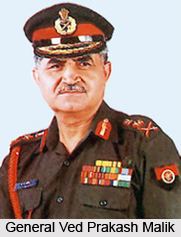 General Ved Prakash Malik was 18th Chief of Army Staff of Indian Army. He assumed the charge on 1 October 1997 from General Shankar Roy Chowdhury. He graduated from the Defense Services Staff College Wellington. After that General V.P. Malik was appointed to Military Ops Directorate at Army HQ in the coin operations dealing section. After completing the Higher Command Course at the College of Combat in Mhow and the National Defense College Course in New Delhi General Malik was appointed as an instructor in the Tactical Wing at the Infantry School in Mhow. General Ved Prakash Malik was also in the Senior Command Wing of the College of Combat in Mhow. Here he gave training from 1977 to 1978.
General Ved Prakash Malik was 18th Chief of Army Staff of Indian Army. He assumed the charge on 1 October 1997 from General Shankar Roy Chowdhury. He graduated from the Defense Services Staff College Wellington. After that General V.P. Malik was appointed to Military Ops Directorate at Army HQ in the coin operations dealing section. After completing the Higher Command Course at the College of Combat in Mhow and the National Defense College Course in New Delhi General Malik was appointed as an instructor in the Tactical Wing at the Infantry School in Mhow. General Ved Prakash Malik was also in the Senior Command Wing of the College of Combat in Mhow. Here he gave training from 1977 to 1978.
General Ved Prakash was commissioned in the Sikh Light Infantry on 7th June 1959 and he commanded the 10th Sikh Light Infantry on the Indo-China border. He successfully executed the COIN operations in Nagaland from 1974 to 1977.During the war against China in 1962 General Ved Prakash Malik was posted to Ladakh sector. He was in different crucial posts including Joint Planning Staff in the Military Wing of the Cabinet Secretariat from 1979 to 1980, Deputy Brigade Commander of an Infantry Brigade from 1980 to 1982, Colonel of an Infantry Division from 1982 to 1983 and Commander of an Infantry Brigade in Jammu & Kashmir from April 1983 to December 1985. At that time General Ved Prakash Malik was conferred with the Ati Vishist Seva Medal.In 1986 he joined the National Defence College course. In 1987 he was nominated as Deputy Director General of Military Operations and served till 1990. During this period he carried out two major international operations - IPKF operations in Sri Lanka and Operation Cactus in Maldives along with making defense plans for the northern borders. In 1989 he was posted as GOC of the 8 Mountain Division. General Ved Prakash Malik led the coin operation in Jammu and Kashmir from 1989 to 1991.
General Ved Prakash Malik was also appointed as an Additional Director General of Operational Logistics, at Army HQ from 1991 to mid-1992. General Ved Prakash commanded 11 Corps in Punjab from August 1992 to March 1994.During this time he was responsible for the operation in the Pakistan border.
General Ved Prakash Malik played active role in upgrading the syllabus and computerization of staff work at Defense Services Staff College in Wellington in 1994 when he was commandant of that college. He was posted, as GOC-in-C Southern Command in 1995.Later General Ved Prakash became the Vice-Chief of Army Staff. In 1996 General Ved Prakash Malik was awarded the prestigious Param Vishist Seva Medal by the President of India.




















